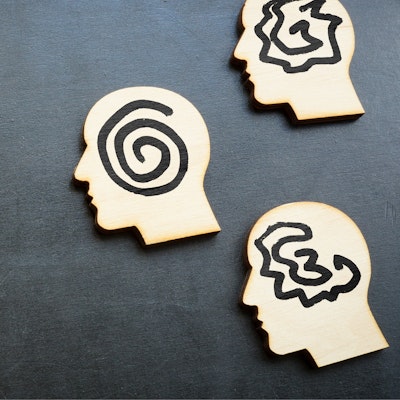Society
Psychology


This episode is from the 2022 Aspen Ideas Festival, but we’re bringing it back because it’s still as relevant as ever. Though it can sometimes feel like conflict and discord is human nature, our brains are actually predisposed to forming groups and working together.


Teenagers and young adults today are dealing with challenges their parents never experienced and couldn’t have prepared for. Nobody has a map and the road to resolution can be bumpy for all involved. Two adolescent psychologists published books last year aimed at helping parents understand and empathize with what their kids are going through and guiding everyone toward hel...


Living a happy life isn’t as simple as having a smile on your face all the time. We often think that our negative emotions should be minimized and repressed, but acknowledging and managing them is actually key to achieving a healthy baseline. Author and Harvard professor Arthur Brooks studies the latest happiness research across behavioral science, philosophy, psychology,...


The human capacity for empathy allows us to communicate, collaborate and understand each other. But we all know empathy isn’t always easy, and we can feel worn down by the effort. MIT professor and researcher Sherry Turkle studies empathy, and particularly how technology can undermine our natural human tendencies to connect. After several books and many decades of work com...


When Duke divinity school professor Kate Bowler wrote her best-selling memoir, “Everything Happens for a Reason (and Other Lies I’ve Loved),” she was grappling with the consequences of a shocking cancer diagnosis. Many of the common messages about hardship, tragedy and success that she’d grown up hearing – and even studied as a religious scholar – no longer seemed to make...


In today’s world, we tend to switch jobs more frequently than previous generations, and are more likely to have multiple jobs. Side gigs where we express passions or find meaning are also common, and many juggle additional roles as caregivers and community members, as people always have. In short, many of us are focused on a lot more than just climbing a corporate ladder....


What is it that pulls one person toward another, and connects them? What does love and attraction do to our brain, and vice versa? Biological anthropologist Helen Fisher has been studying questions of love and relationships for over 40 years. Through detailed data collection, research questionnaires and even brain scans, she has collected massive amounts of information on...


We could look at people who veer off society’s dominant tracks into moral gray zones as simply bad, or damaged, or living the consequences of bad choices. But from the inside, people always have reasons for doing what they do, and when all the cards are on the table, morality can become murkier. New Yorker writer Patrick Radden Keefe is fascinated by what drives people who...


Professor Zoe Chance, who teaches the most popular class at the Yale School of Management, illuminates the skills and strategies necessary to improve your natural ability to persuade.


We try our whole lives to avoid pain and suffering and when it does show up, we try to solve it. In her new book, No Cure for Being Human, religious scholar Kate Bowler says we try to out-eat, out-learn, and out-perform our humanness. Truth is, bad things do happen to good people and if we're going to tell the truth, we need one another. As someone who lives with cancer, B...


Though it can sometimes feel like conflict and discord is human nature, our brains are actually predisposed to forming groups and working together. In our individualistic society, we may think our minds stop at our skulls, but when people come together and connect effectively, they actually think in different ways, and they all become smarter and healthier together. Scienc...


For many people, the COVID-19 pandemic lockdown became an unexpected opportunity to take stock of our relationships. Some friendships deepened and transformed, some slipped away, and many social circles shrank. Which isn’t always a bad thing.


We try our whole lives to avoid pain and suffering and when it does show up, we try to solve it. In her new book, "No Cure for Being Human," religious scholar Kate Bowler says we try to out-eat, out-learn, and out-perform our humanness. Truth is, bad things do happen to good people and if we're going to tell the truth, we need one another. As someone who lives with cancer,...


John Hagel, author of "The Journey Beyond Fear," says there's increasing fear and uncertainty in the world and it's not just from the pandemic. Competition for jobs, mounting performance pressure, and a rapidly accelerating pace of change are escalating fears, especially in the workplace. But fear exists in other places — far-flung locales few people visit. Alison Levine i...


A person with grit, says psychologist Angela Duckworth, uses passion and long-term perseverance to reach goals. Reaching success, she says, is about stamina over months and years, not talent or a high IQ. In her research, Duckworth studied cadets struggling through their first days at West Point, teachers working in some of the toughest schools, and young finalists in a na...


People are in constant conversation with their dogs, says dog scientist Alexandra Horowitz, and dogs pick up on things like our tone of voice. "We think meaning is all in the words but for them, the meaning is in the context, and they’re working very hard to understand it.” Horowitz studies dog cognition and the relationship between dogs and their human owners. She runs th...


As many of us know personally, the coronavirus pandemic has taken a toll on mental health. As lockdowns were enacted, loneliness, isolation, and depression increased. Concerns of loved ones dying and fear of contracting the virus affected our well-being. Since April of 2020, about 40 percent of US adults have reported symptoms of depression and anxiety. In 2019, that figur...


When she met him, Tanya Selvaratnam thought New York State Attorney General Eric Schneiderman was her perfect match. But as time went on, Schneiderman became controlling, mean, and manipulative. In her new book, Assume Nothing, Selvaratnam chronicles how domestic violence took away her voice, how she managed to get it back, and her decision to use it to help other women fi...


Why is it so hard to watch our children fail? Why might a highly structured life for a child be a bad thing? And how important is our behavior, as adults, in the development of a child? Psychologist Angela Duckworth explains how to raise a child with strong character.


The time we’re living in is unusually tumultuous. The Covid-19 pandemic is causing loss, disruption, illness, grief, anxiety, and uncertainty.





